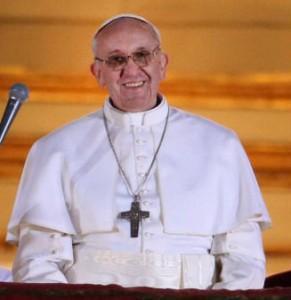
It's interesting to see glimmers of a meme now developing in the secular media regarding Pope Francis. A few days ago, at the Talking Points memo site, Sahil Kapur posted an article about why liberals are enchanted with the new pope. Here's how Kapur sums up the case:
In a way, Pope Francis is a progressive’s dream-come-true — a devout figure with enormous credibility among conservatives and Christians, who has used his megaphone to speak out against greed, consumerism and economic policies that alienate the poor and vulnerable.
For the New Yorker, Hendrik Hertzberg also recently wrote about why, as a nonbeliever, he was encouraged with Francis's remark that (gasp!) even atheists may be heaven-bound and have something to teach Christians (see also Robert McClory at NCR). Hertzberg also notes that he's not particularly impressed by the corrective statements some Vatican officials issued after Francis made this remark. In his view, the corrections have a "high weasel factor" about them.
Here's Hertzberg's summary of why he finds Francis worth listening to up to now:
The former Cardinal Jorge Mario Bergoglio’s choice of a name was another hopeful sign. Calling himself Francis was an act of humble audacity, or audacious humility: he is the first Pope in more than a millennium to pick a name that doesn’t require a Roman numeral, because none of his predecessors used it. And the name itself, echoing Francis of Assisi, is a byword for poverty, simplicity, and kindness. A couple of weeks ago, in a letter to an old friend, the Pope explained why he has been reluctant to leave the relatively modest group residence where he and the other Cardinals stayed during the conclave that elected him. "I didn’t want to go and live in the apostolic palace," he wrote. "I'm trying to stay the same and to act as I did in Buenos Aires because if you change at my age you just look ridiculous."
Of course, the question is whether the changes to come will go beyond personal style and charm. For the time being I’m inclined to give Pope Francis the benefit of the doubt. After all, that’s what he’s given me.
At the same time that I'm listening with interests to these voices outside Catholic, Inc., who find signs of hope in the new pope, I'm also continuing to listen to fellow Catholics whose judgment I respect, who ask if we're canonizing Francis far too precipitously. In a well-researched and comprehensive posting at Open Tabernacle recently, Betty Clermont notes that Francis's longtime critic, Argentinian journalist Horatio Verbitsky, has characterized Francis as an "ersatz" pope.*
Ersatz in the following sense, Betty writes,
Claiming concern for the poor while undermining a government trying to alleviate poverty, Bergoglio was elected by the College of Cardinals to preserve a Church of, by, and for the plutocracy.
As she also notes,
Claiming concern for the poor while undermining a government trying to alleviate poverty, Bergoglio was elected by the College of Cardinals to preserve a Church of, by, and for the plutocracy.Yes, Francis has made several statements in favor of economic structures which favor the poor, but so has every other modern pope. Regardless of what these pontiffs said (with the exception John XXIII), they supported imperialists, fascists, dictators, corporatists, oligarchs and plutocrats.
I hear Betty's point, and I think it's important for those who see Francis's statements of concern about the poor as heartening to take seriously. For a long time now, top Catholic officials (and bishops in the U.S.) have been perfectly capable of saying very nice things about the poor and about economic justice, while allying themselves with the very folks most intent on making the poor miserable in the world in which we live today. It's hard to avoid the impression that statements made by top Catholic leaders and their epigones about how the Catholic church stands with the poor and those on the margins are sometimes impression-management statements designed to give the church a good image among those working for social justice, while not relinquishing toxic alliances between top Catholic leaders and the hard right (and super-rich) in many parts of the world.
These nice statements about social justice are often perceived (and rightly so, I believe) by some people working for social justice as window-dressing statements that don't translate into action . . . . And so I second Hendrik Hertzberg's call to watch and see whether the changes Francis seems to portend will go beyond personal style and charm (that is, to see whether they'll go beyond image-management in a church whose top leaders have given the Catholic church a serious black eye in secular culture in recent years, and among many Catholics, as well, and which is therefore sorely in need of new and better branding from the top down).
With Hertzberg and others, I continue to hope. But I hope for what is substantial and not pretty new dressing for the windows of Catholic, Inc. I hope for what's substantial, above all, for LGBT people, for women, and for survivors of childhood sexual abuse by Catholic religious authority figures.
*To be clear, the phrase about precipitous canonization is mine and not Betty's. I should note that I listen seriously to what Betty says, because I have high regard for her and know that she speaks out of a wealth of experience and knowledge. I also have a friend, equally erudite, who has long followed Verbitsky's career, and who tells me he regards Verbitsky as less than credible--and I listen to this friend carefully for the very same reason I take Betty's insights seriously.

